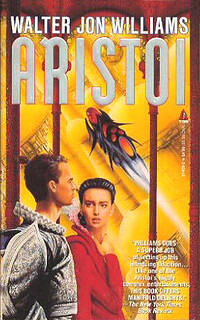Call number
Genres
Publication
Tor Books (1993), Paperback
Pages
448
Description
Successful in its efforts to create a glittering interstellar empire, founded on the use of an ultra-advanced computer and bioengineering technology, humankind becomes the prey of its own creation, the Aristoi.
Language
Original language
English
Original publication date
1992-09
Physical description
448 p.; 6.9 inches
ISBN
0812514092 / 9780812514094
Similar in this library
User reviews
LibraryThing member eviljosh
It's rare that I read something different enough to be considered unique, but the society and culture painted in this book is something I've never encountered before.
The world building is truly stupendous. A distant future humanity, scarred by the accidental destruction of Earth, rebuilds a new
Williams describes the Aristoi, saying: "Without doubt she would achieve the rank of Ariste: the long-latent synthesis, the tumbling-together of ideas, had begun. The integrative thinking of the Aristoi, wherein each thought, each skill and idea, began to expand and multiply and reinforce the other." Describing their relationship to the rest of humanity, an Aristos states: "We dominate humanity because we can't help it, and because the others couldn't stop it even if they wanted to."
The result is a society that is simultaneously a techno-utopia and a radical authoritarian dystopia (fascism without the nationalist connotations), made all the more frightening because the thought of disobedience to an Aristos is literally inconceivable to the vast majority of indoctrinated humanity.
This marvelous world building creates a set of main characters (Aristoi and their senior bureaucrats) that is simultaneously fascinating, desirable, and appalling. They believe they are superior and entitled...nearly godlike...and the reader has a hard time disagreeing, while all the while rebelling against such a notion notion as anathema to our current liberal society based upon the notion that all are created equal.
Combine that with the strange psychology of the characters (the society believes that multiple personalities - inner demons - are to be encouraged, named, and treasured, in order for multifaceted individuals to fully unlock their true potential), and this book is well worth reading.
The world building is truly stupendous. A distant future humanity, scarred by the accidental destruction of Earth, rebuilds a new
Show More
civilization. One of the core values of this civilization is that information must be free, but technology has become powerful enough, dangerous enough, that it can only be wielded in all its glory by gods. So the Aristoi are created, gods among men, to play the role of the divine (though perhaps they are are best viewed as philosopher kings).Williams describes the Aristoi, saying: "Without doubt she would achieve the rank of Ariste: the long-latent synthesis, the tumbling-together of ideas, had begun. The integrative thinking of the Aristoi, wherein each thought, each skill and idea, began to expand and multiply and reinforce the other." Describing their relationship to the rest of humanity, an Aristos states: "We dominate humanity because we can't help it, and because the others couldn't stop it even if they wanted to."
The result is a society that is simultaneously a techno-utopia and a radical authoritarian dystopia (fascism without the nationalist connotations), made all the more frightening because the thought of disobedience to an Aristos is literally inconceivable to the vast majority of indoctrinated humanity.
This marvelous world building creates a set of main characters (Aristoi and their senior bureaucrats) that is simultaneously fascinating, desirable, and appalling. They believe they are superior and entitled...nearly godlike...and the reader has a hard time disagreeing, while all the while rebelling against such a notion notion as anathema to our current liberal society based upon the notion that all are created equal.
Combine that with the strange psychology of the characters (the society believes that multiple personalities - inner demons - are to be encouraged, named, and treasured, in order for multifaceted individuals to fully unlock their true potential), and this book is well worth reading.
Show Less
LibraryThing member datwood
In a future world the Aristoi are the ones who, through genetic manipulation, control the worlds configured in reality and in simulation (think Second Life with tactile and odor added). The Aristoi are encouraged to call up their inner daemons (the more the merrier) and do whatever pleases them.
Show More
This can and does lead to abuses. It can also lead to boredom and confusion on the part of the reader. Show Less
LibraryThing member Clevermonkey
Interstellar meritocracy where the elite of the elite control nanotech to prevent repeat of "gray goo" which ate Earth. One of these "Aristoi" goes bad and creates whole worlds of humans to experiment on - whoa!
